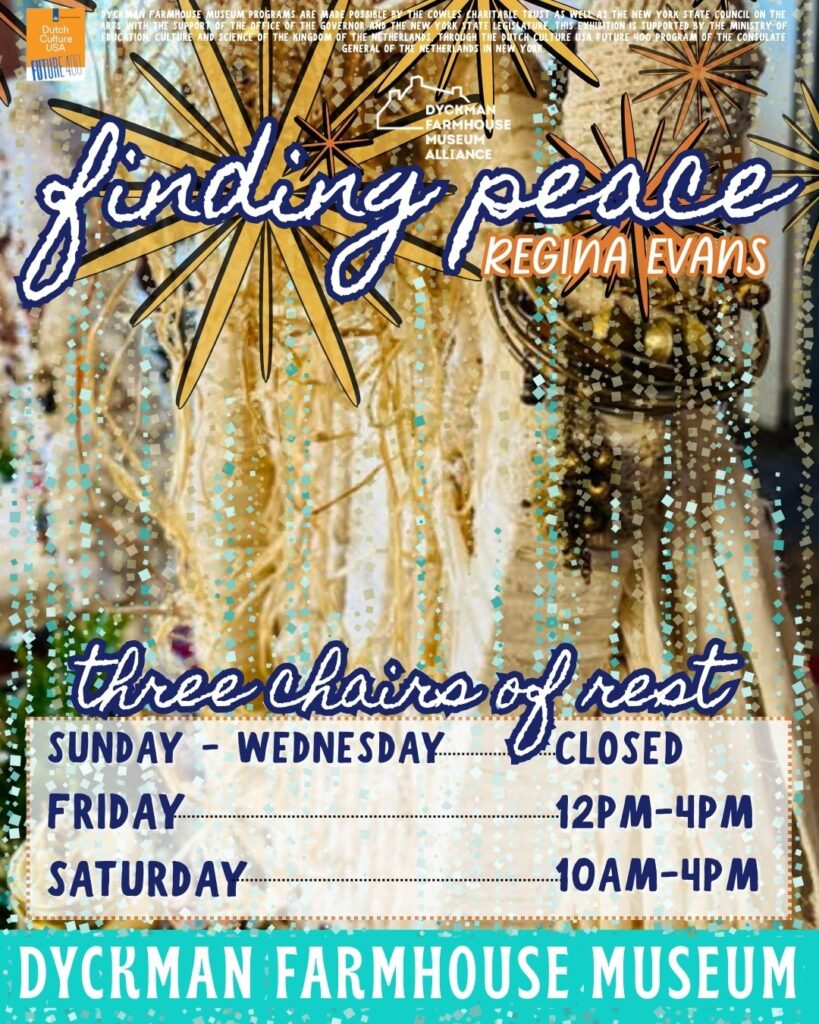
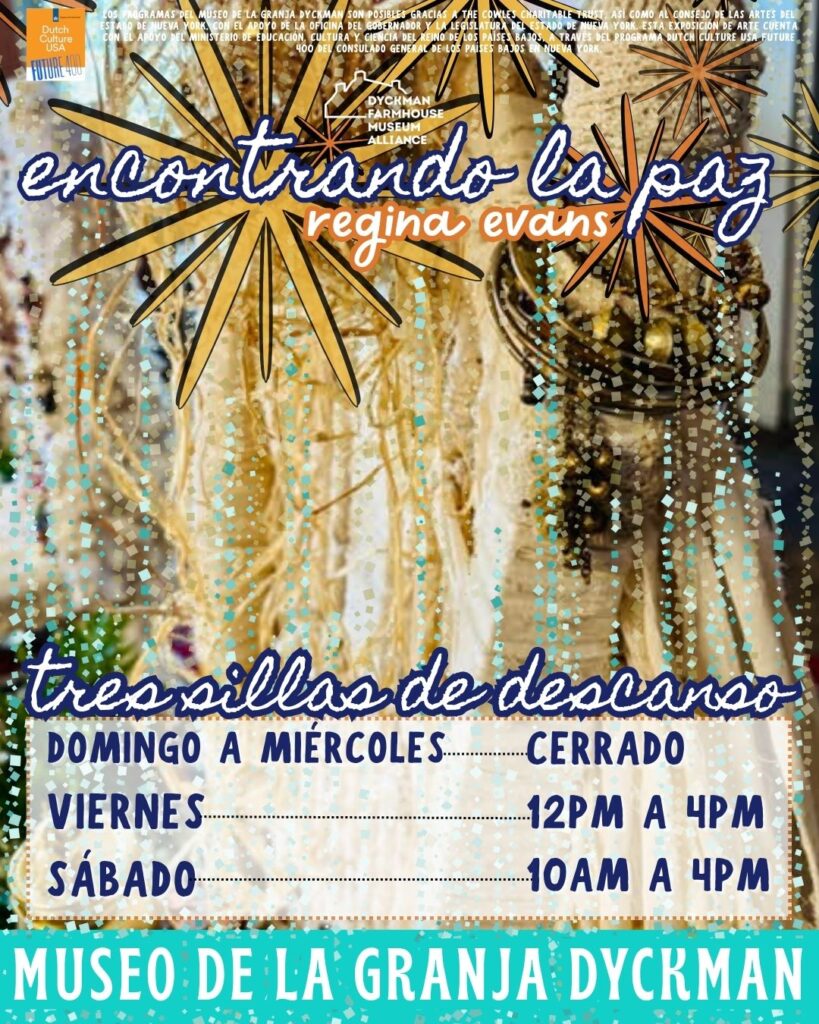
Dyckman Farmhouse Museum Alliance conducted archival research in 2023-2024 that uncovered the names of several free and enslaved individuals connected to the Dyckman Family. Inspired by these findings, artist and activist Regina Evans created an altar that memorializes the lives of Harey, Hannah, Will, Francis Cudjoe, Gilbert Horton, and all others who once unjustly lived and labored here.
Evans used collected objects linked to African-American identity, tools of labor, and symbols of solace to assemble an altar of three seats—a place of rest for the spirits of these ancestors.
As part of the exhibition, Evans also facilitated two drop-in workshops where local participants crafted letters, poems, and images as an offering to the altar. She bound these loving offerings into a book to be displayed for public view beside the altar.
Through this book, our community deliberately acknowledges the life’s journey of those enslaved by the Dyckman Family, so that they are honored and remembered with messages of joy, hope, and humanity.
On view: October 1, 2025 – ongoing
Visiting Hours: Friday 12pm-4pm and Saturday 10am-4pm
Museum Admission: $3 (FREE for Uptown Residents!)
Location: Dyckman Farmhouse Museum (on the corner of 204th and Broadway)
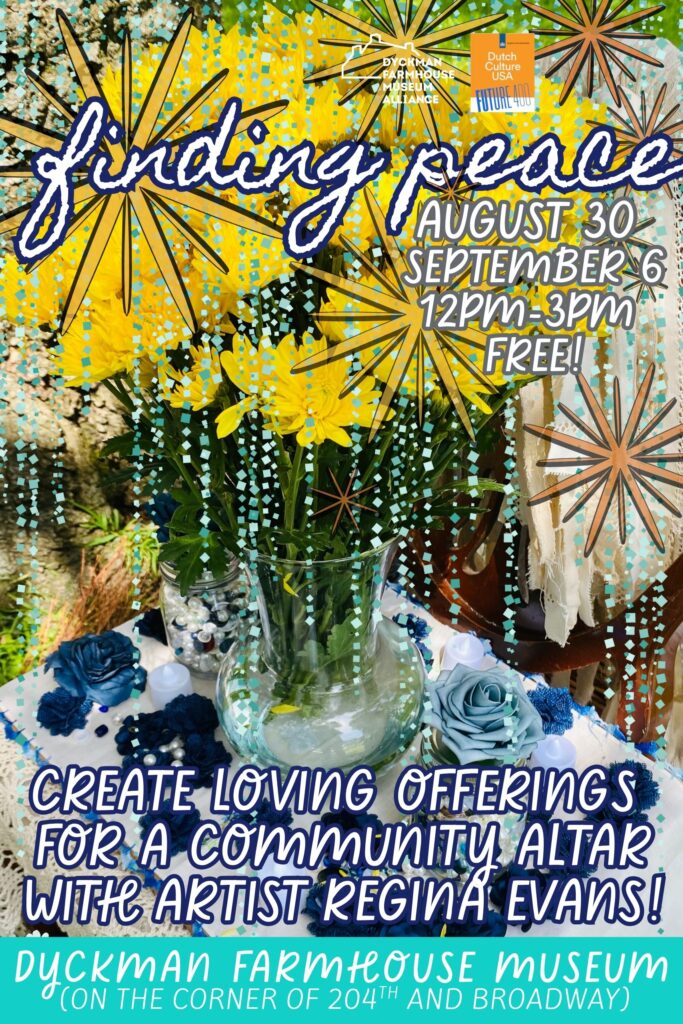
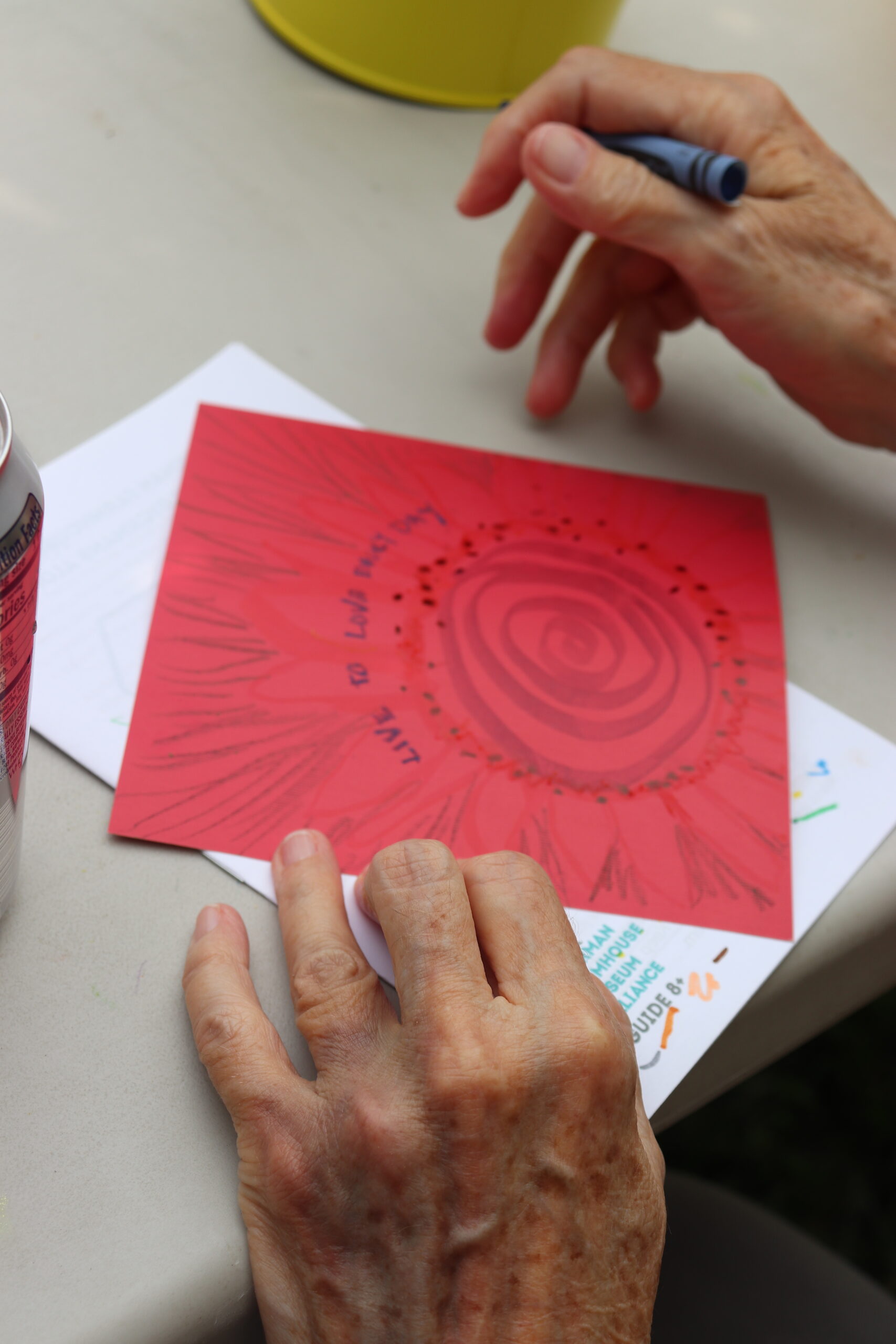
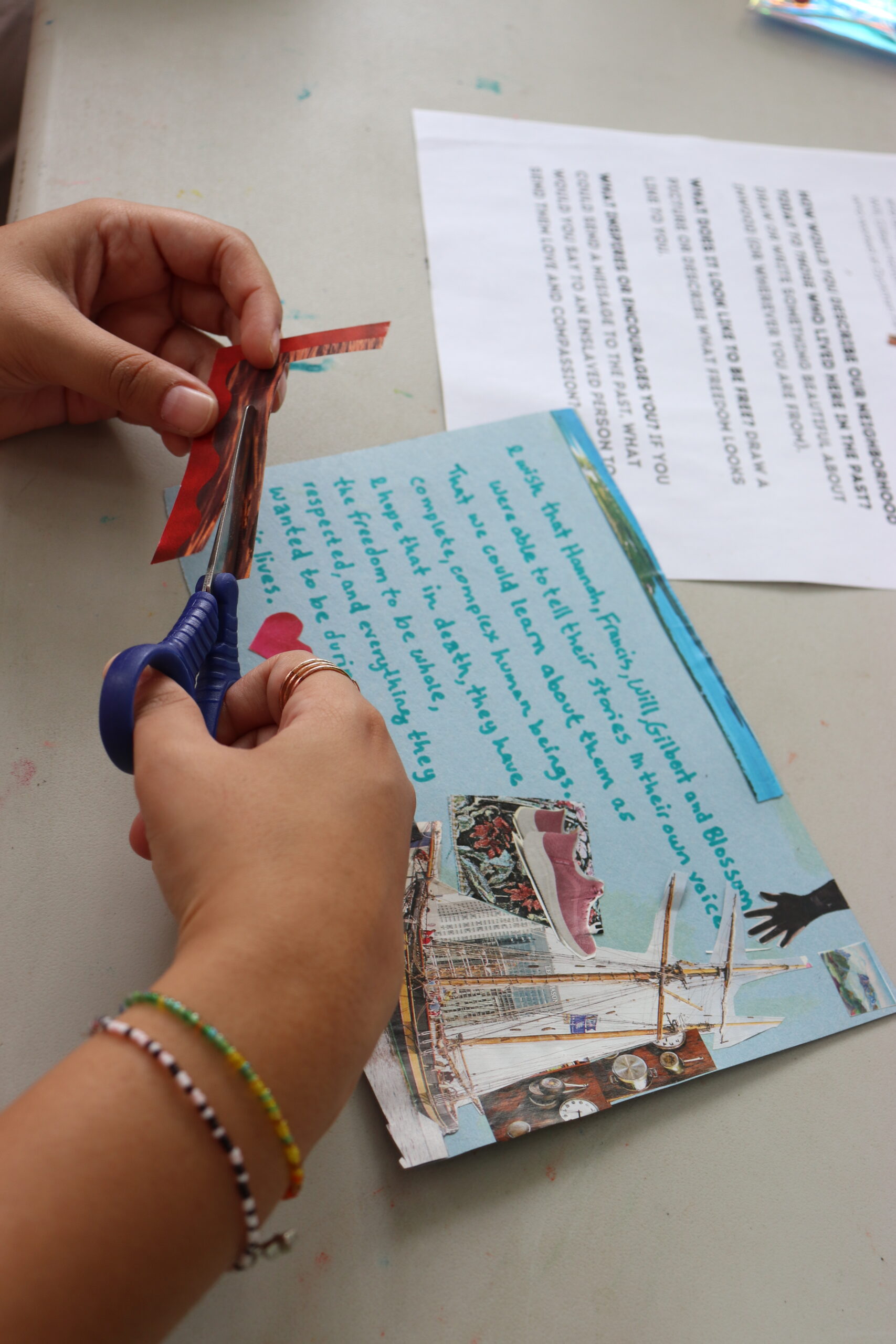
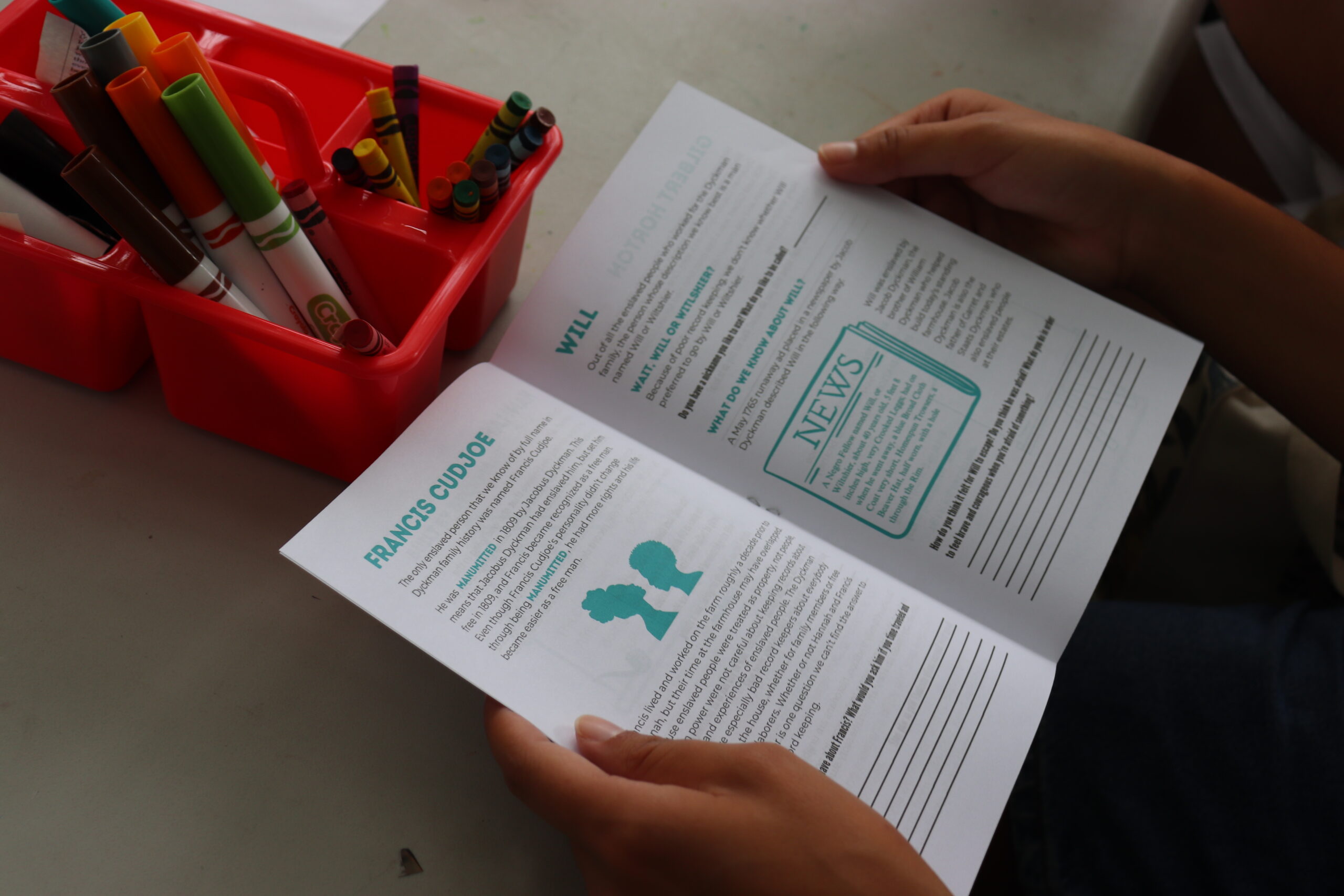
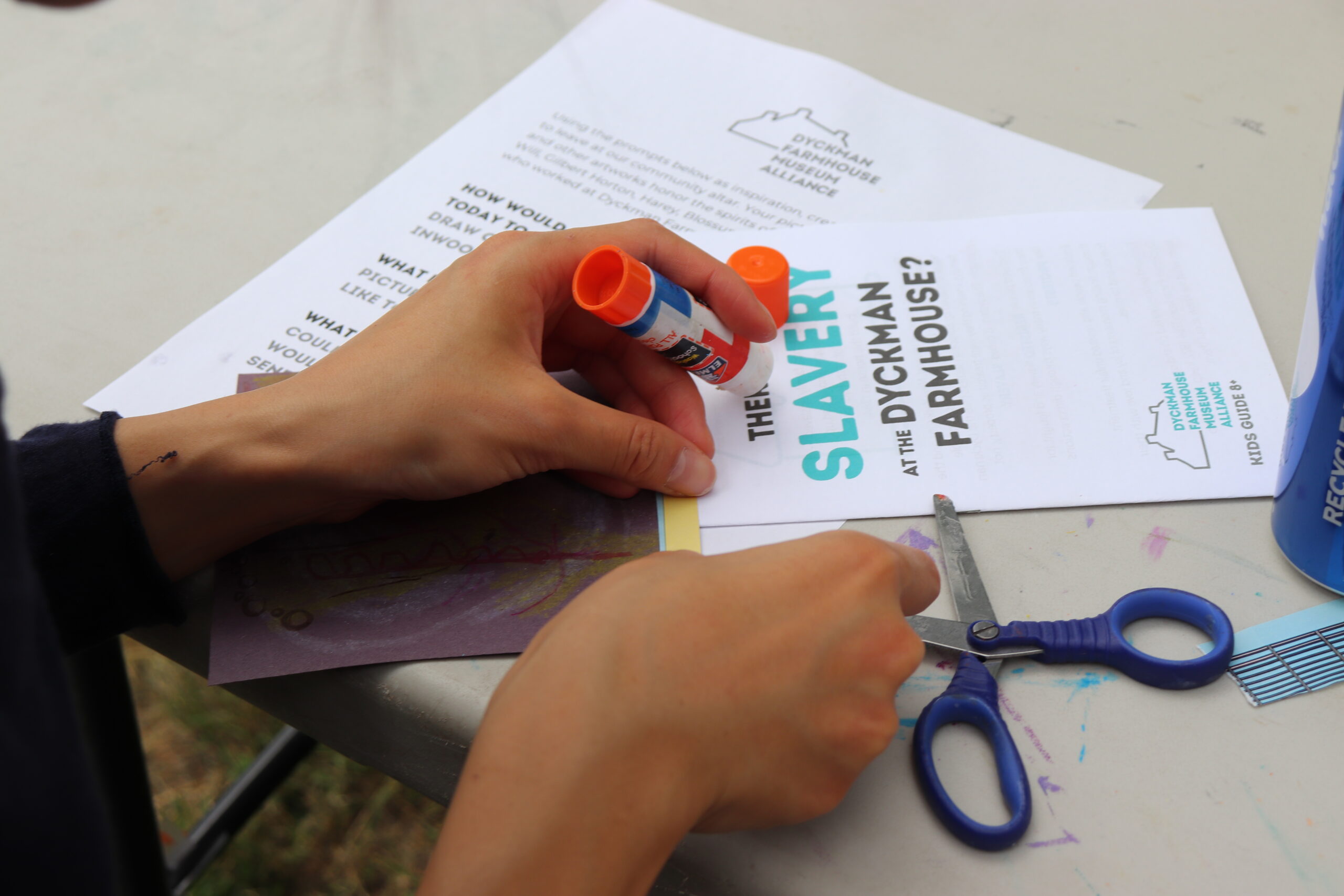

As I researched the 1904 desecration and dismantling of the Inwood African Burial Ground, I was confronted with the laws that regulated the funeral services of the enslaved who lived and toiled in New York City. Because of these instituted rules, burials for the enslaved were forced to be both sparse in attendance and ceremony.
As I created the resting chairs, I sought to counteract this notion of required lack. My desire was to design seats of honor, in remembrance of the enslaved, that were characterized by visual abundance, sanctuary, beauty, spirit and freedom.
My artistic hope was that the chairs would mirror some of the inner truths of the enslaved. Largely, their ability to (under harsh life circumstances) maintain within and hold onto the principles of love, faith, integrity, resilience, compassion and grace. Surely such a thing is worthy of beautiful abundance as they rest.
– Regina Evans

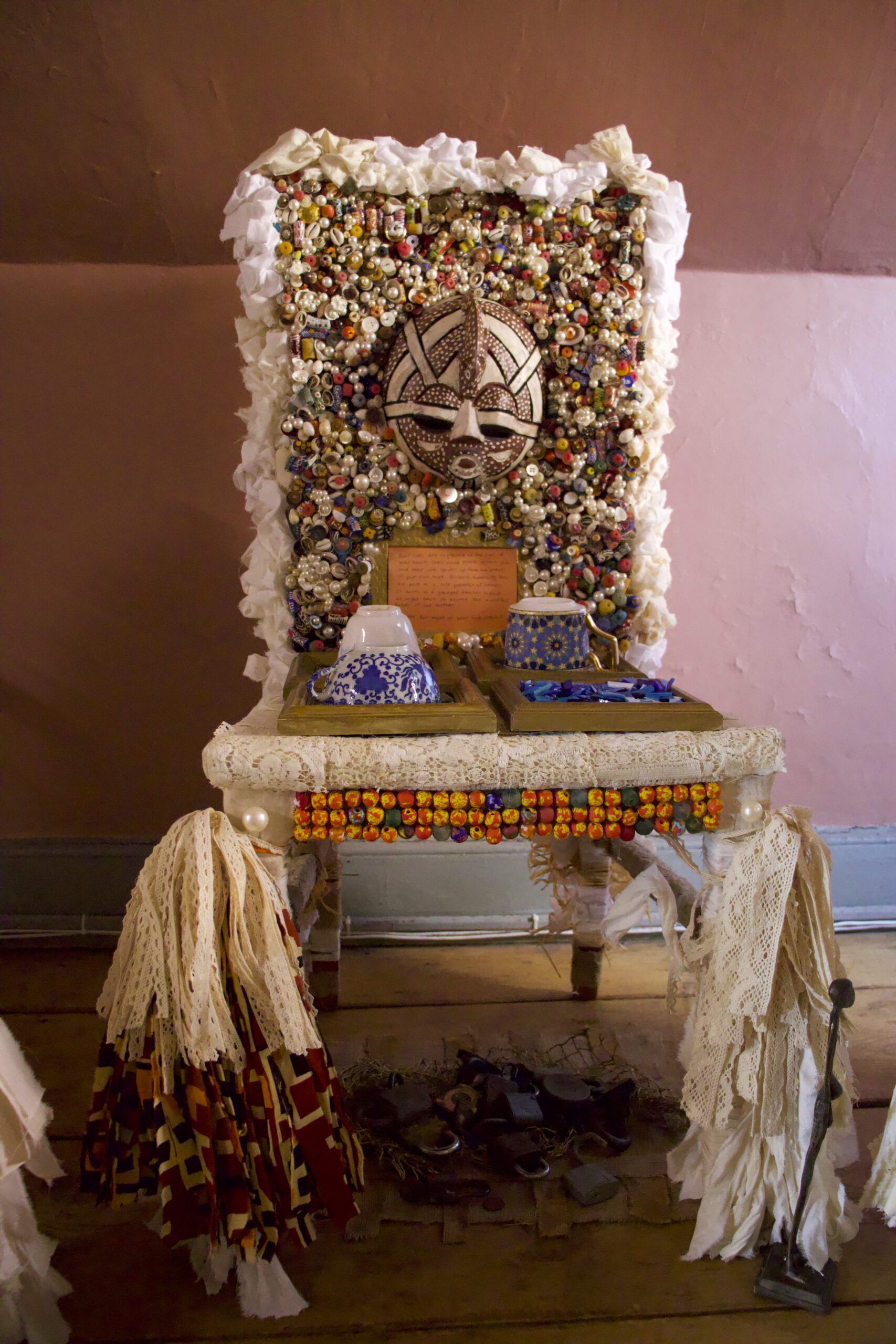
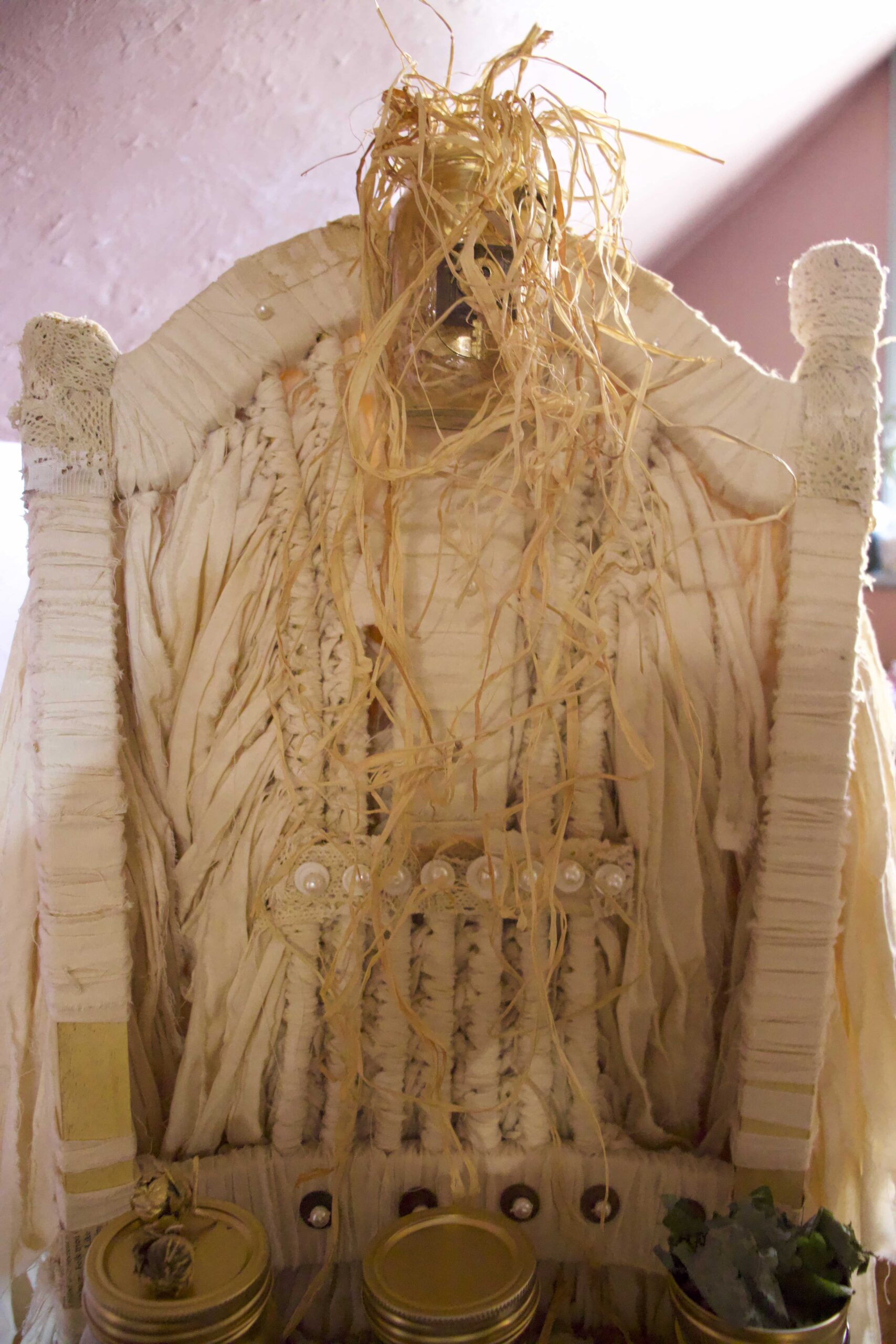
This exhibition is part of Dyckman Farmhouse Museum’s (DFM) ongoing programming honoring the Inwood Sacred Site. The Inwood Sacred Site is a memorial set to open at 212th Street and 10th Avenue, which was once the location of a burial ground for the enslaved.
The burial ground was located on Dyckman farmland near Lenape shell middens from an earlier period. Starting in 1903, the site was excavated and the remains were discarded unceremoniously.
When Bowery Residents Committee (BRC), a non-profit that serves unhoused New Yorkers, purchased the lot on 212th and 10th Avenue in 2020, we began a partnership to appropriately memorialize the significance of that area as both an enslaved burial site and indigenous ceremonial ground. BRC has designated a space for the memorial—The Inwood Sacred Site—which DFM will operate, while the rest of the building will serve as BRC’s newest transitional shelter for unhoused New Yorkers.
Together, BRC and DFM will serve displaced people across space and time. Our hope is that Inwood Sacred Site will serve as a meaningful place for descendant and indigenous communities to reflect on their history and ancestors, as well as an educational resource for members of the public and present-day Inwood residents.
English: Download the exhibition guide!
Regina Y. Evans is an award winning Social Justice Playwright/Actor, Poet, Entrepreneur, Costume Designer, and Installation Artist. Her creative work largely focuses upon the healing of Black girls and women, the historical commodification of the Black female womb, and the fight against child sex trafficking.
Her work has been recognized by Lower Manhattan Cultural Council, Oakland City Council, San Francisco Collaborative Against Human Trafficking, BroadwayWorld San Francisco Awards, SF Fringe Festival Awards, Eugene O’Neill National Playwrights Conference, among others.
Previously, Evans founded and ran two creative arts healing spaces for young survivors of sex trafficking in Oakland, CA—Regina’s Door and Conjure and Mend—through 2021.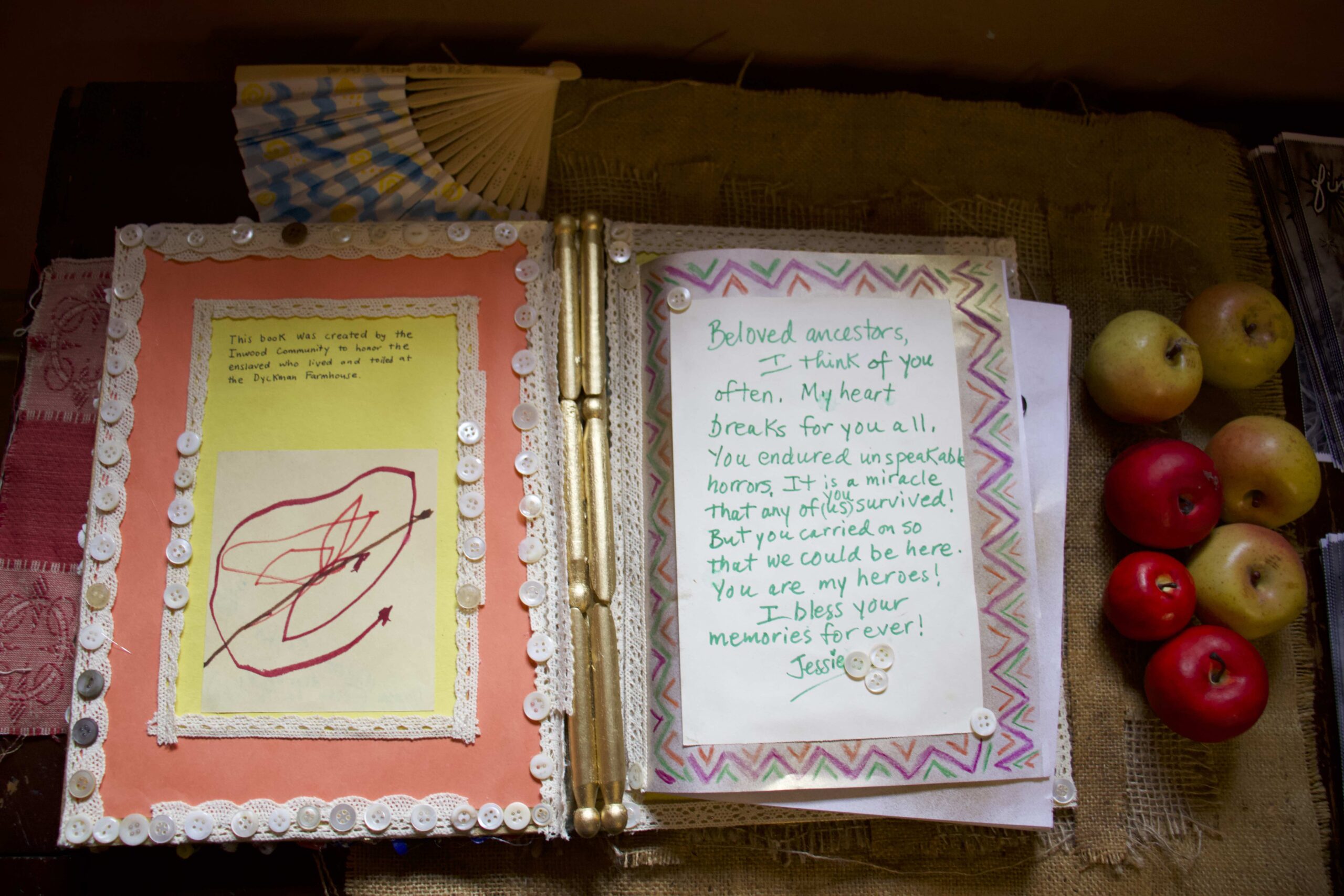
El Museo de la Granja Dyckman llevó a cabo una investigación de archivo en 2023-2024 que reveló los nombres de varias personas libres y esclavas relacionadas con la familia Dyckman. Inspirada por estos descubrimientos, Regina Evans creó un altar que conmemora las vidas de Harey, Hannah, Will, Francis Cudjoe, Gilbert Horton y todos los demás que una vez vivieron y trabajaron injustamente aquí.
Evans utilizó objetos relacionados con la identidad afroamericana, herramientas de trabajo y símbolos de consuelo para montar un altar de tres asientos— un lugar de descanso para los espíritus de estos antepasados.
Como parte de la exposición de arte, Evans facilitó dos talleres gratuitos donde miembros de la comunidad crearon cartas, poemas e imágenes como ofrenda al altar. Ella encuadernó estas ofrendas cariñosas en un libro para exhibirlas junto al altar.
Con este libro, nuestra comunidad reconoce deliberadamente el recorrido vital de las personas esclavizadas por la familia Dyckman, para que sean honradas y recordadas con mensajes de alegría, esperanza y humanidad.
Abierto al público: 1 de octubre de 2025 – en curso
Horario de visita: viernes de 12pm a 4pm y sábados de 10am a 4pm
Entrada al museo: $3 (¡GRATIS para los residentes del Alto Manhattan!)
Ubicación: Museo de la Granja Dyckman (en la esquina de la calle 204 y Broadway)
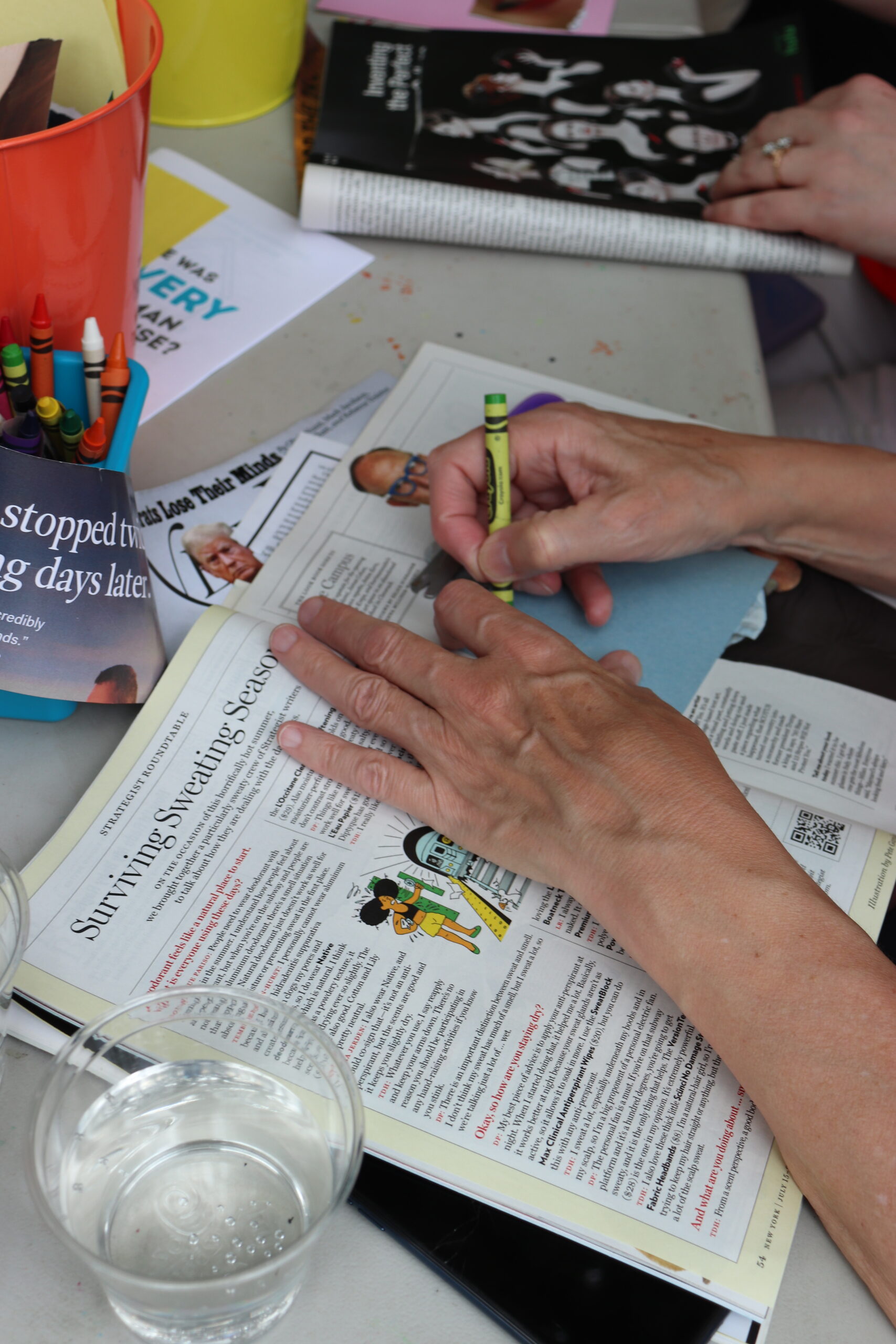

Mientras investigaba la profanación y el desmantelamiento del cementerio africano de Inwood en 1904, me topé con las leyes que regulaban los servicios funerarios de los esclavos que vivían y trabajaban en la ciudad de Nueva York. Debido a estas normas instituidas, los entierros de los esclavos eran escasos en asistencia y ceremonia.
Al crear las sillas de descanso, busqué contrastar esta noción de falta obligatoria. Mi deseo era diseñar asientos de honor, en memoria de los esclavos, que se caracterizan por la abundancia visual, el santuario, la belleza, el espíritu y la libertad.
Mi esperanza artística era que las sillas reflejarán algunas de las verdades internas de los esclavos. En gran medida, su capacidad para (en circunstancias de vida difíciles) mantener y aferrarse a los principios del amor, la fe, la integridad, la resiliencia, la compasión y la gracia. Sin duda, algo así es digno de una hermosa abundancia de ofrendas mientras ellos descansan.
– Regina Evans

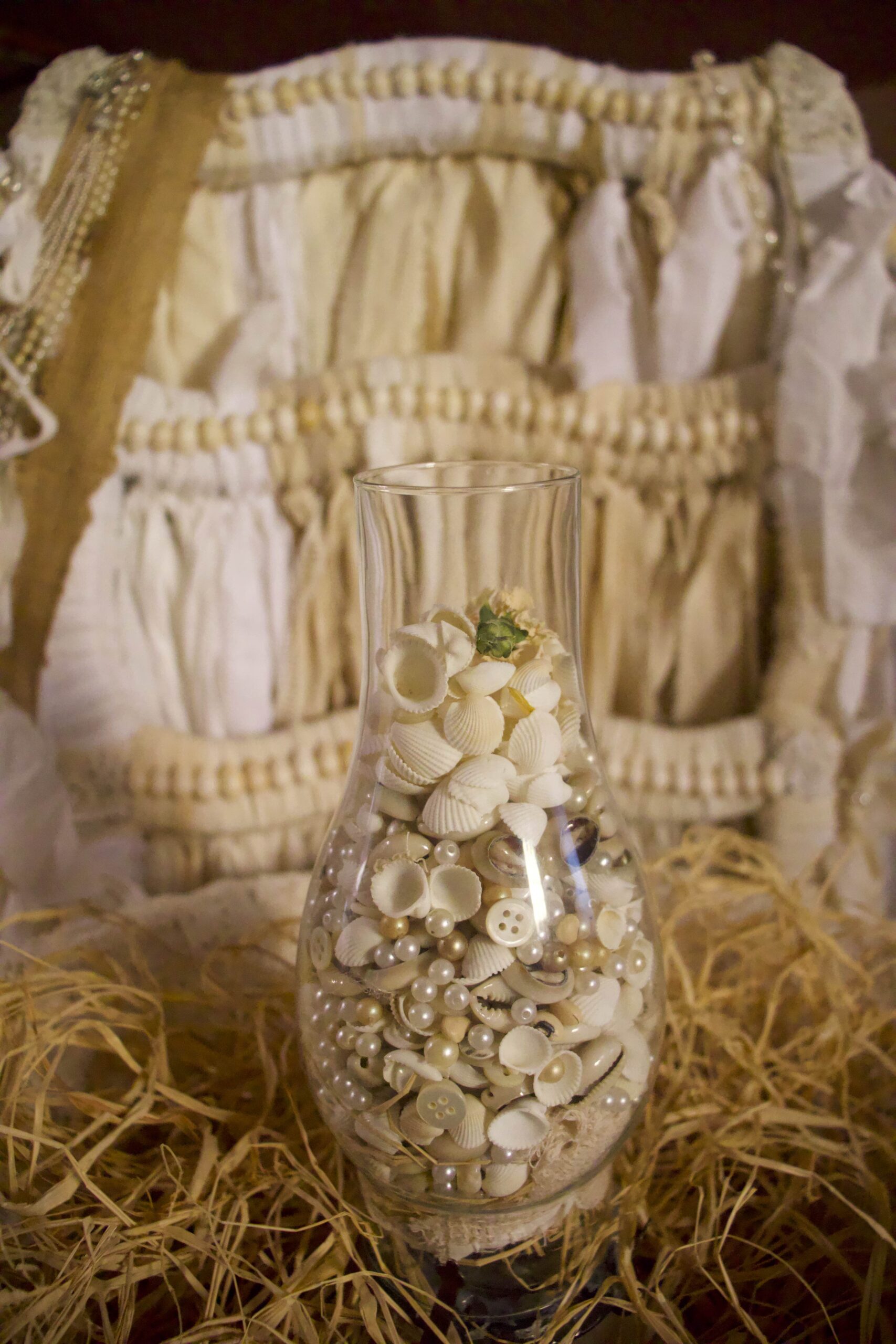

Esta exposición de arte forma parte de la programación continua del Museo de la Granja Dyckman (DFM) en conmemoración del Sitio Sagrado de Inwood. El Sitio Sagrado de Inwood es un monumento conmemorativo que se inaugurará en la calle 212 y la décima avenida, donde antiguamente se encontraba un cementerio para esclavos.
El cementerio estaba situado en las tierras agrícolas de la familia Dyckman, cerca de montones de residuos de un período anterior y pertenecientes a las comunidades Lenape que vivían allí. A partir de 1903, el cementerio fue excavado y los cadáveres fueron trasladados y desechados sin miramientos.
Cuando el Comité de Residentes de Bowery (BRC), una organización que ayuda a los neoyorquinos sin hogar, compró el terreno en la calle 212 y la décima avenida en 2020, iniciamos una colaboración para conmemorar adecuadamente la importancia de esa zona como lugar de enterramiento de esclavos y terreno ceremonial indígena. El BRC ha designado un espacio para el memorial, denominado Sitio Sagrado de Inwood, que gestionará DFM, mientras que el resto del edificio servirá como el nuevo refugio de transición del BRC para los neoyorquinos sin hogar.
Juntos, BRC y DFM servirán a los desplazados a través del espacio y el tiempo. Esperamos que el Sitio Sagrado de Inwood sea un lugar valioso para que las comunidades indígenas y descendientes puedan reflexionar sobre su historia y sus antepasados, así como un recurso educativo para el público general y los residentes actuales de Inwood.
Spanish: ¡Descarga la guía de la exposición!
Regina Y. Evans es una premiada dramaturga y actriz dedicada a la justicia social, poeta, diseñadora de vestuario, empresaria y artista de instalaciones. Su trabajo creativo se centra principalmente en la sanación de las niñas y mujeres negras, la mercantilización histórica del útero femenino negro y la lucha contra el tráfico sexual infantil.
Su trabajo ha sido reconocido por el Consejo Cultural del Bajo Manhattan, el Ayuntamiento de Oakland, la Colaboración contra el Tráfico de Personas de San Francisco, los Premios BroadwayWorld San Francisco, los Premios SF Fringe Festival y la Conferencia Nacional de Dramaturgos Eugene O’Neill, entre otros.
Anteriormente, Evans fundó y dirigió dos espacios creativos de sanación para jóvenes sobrevivientes del tráfico sexual en Oakland, California: Regina’s Door y Conjure and Mend, hasta 2021.
